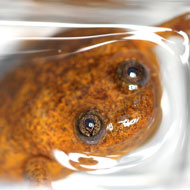Rare frogs bred in the UK are a world-first

Female Lake Oku clawed frog.
Keepers at London Zoo have become the first in the world to successfully breed the critically endangered Lake Oku clawed frog.
The species is unique to Lake Oku, a high altitude freshwater lake in Western Cameroon, Africa. The small aquatic frogs are among the most genetically unusual creatures in the world, having evolved to develop 12 sets of chromosomes, which is almost unique among animals.
As their wild habitat is limited to just a single, relatively small site, Lake Oku clawed frogs are extremely vulnerable to the threat of disease or invasive species. Ben Tapley, head of London Zoo's reptile and amphibian team, said it would be "catastrophic" if these were introduced to the lake, which is viewed as a sacred place by the local people.
This breeding success also allows experts to study the frogs' behaviour for the first time, which is a crucial part of ensuring the future survival of the species.
“We will now be able to share our insights gleaned from naturally breeding these frogs with conservation biologists working with the species in Cameroon and zoos around the world to help ensure a sustainable population can be maintained," Mr Tapley said.
Keepers replicated the environmental conditions of Lake Oku using precise data gathered by field biologists. Out of the 13 tadpoles at London Zoo, four have already metamorphosed into juvenile frogs.
The Lake Oku clawed frogs can be seen at the zoo's amphibian and reptile house.
Image © Ben Tapley/ZSL



 The veterinary mental health charity Vetlife is inviting the veterinary community to join it for a sponsored cold-water dip.
The veterinary mental health charity Vetlife is inviting the veterinary community to join it for a sponsored cold-water dip.